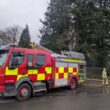Policing response teams are to be axed and the number of neighbourhood policing teams cut back as part of the latest fall-out of the budgetary cuts.
The move was revealed this morning (Thursday) by the PSNI’s Assistant Chief Constable Stephen Martin.
The changes will actually see the introduction of what are called ‘Local Policing Teams’, while the number of policing districts will be increased.
There are currently seven across the Province, with Armagh falling within E District.
But in April this will be increased to 11 districts to go hand-in-hand with the change-over to 11 new ‘super-councils’.
It is the biggest shake-up in policing in years and it comes as a result of significant budget pressures, combined with a requirement to align with new council structures by April 1.
Superintendent David Moore will be the new District Commander for the Armagh, Banbridge and Craigavon policing area.
The news comes just hours after it was revealed by Justice Minister David Ford that a public consultation was opening on the closure of eight local courts, including the Armagh Courthouse.
Assistant Chief Constable Stephen Martin, the senior officer responsible for District Policing, outlined the new structure.
He said: “The new district councils come into existence on 1 April 2015, and I have been charged with shaping our front line service delivery so that our District Command boundaries mirror those councils.
“Some key decisions have already been taken in relation to the new policing structure and how it will function. Senior officers have now been appointed to deliver policing within Northern Ireland’s communities and their core purpose will be to continue to ‘Keep People Safe’ through the ethos of ‘Policing with the Community’.
“We will move from the existing seven policing districts to 11. However, we are making this change at a time of continuing budget cuts and so we cannot simply replicate our existing district structures taking into account our reducing resources.
“While leaner and more streamlined, the new 11 districts will focus on local priorities under the leadership of a District Commander.
“The districts will be supported by an Area co-ordinating tier covering Belfast and Northern and Southern parts of Northern Ireland.
“These will provide additional resources to help deal with local priorities and emerging threat, risk and harm issues. They will have the ability to muster and move resources to where the need is greatest on a daily basis.
“This structure will allow us to use officers and staff more flexibly and ensure we keep people safe across all our districts, as well as providing local accountability and effective partnership working.
“Our aim is to ensure that our service to all communities in Northern Ireland is fit for purpose and sustainable while still delivering savings.
“This year we had to cut over £38m from our budget and next year’s reductions will also be in the region of £40m.
“I would urge the public to understand that there must be changes in the way that policing services are delivered as we continue to restructure. The impact of the budget cuts will not be felt on district policing alone; it will be right across the full spectrum of policing.”
ACC Martin confirmed that the 11 District Commanders have already been appointed across Northern Ireland.
Superintendent David Moore will be District Commander for Armagh, Banbridge and Craigavon Area. He will be responsible for all aspects of local policing and setting Armagh, Banbridge and Craigavon Area’s policing priorities, along with the Policing and Community Safety Partnership (PCSP).
Superintendent Moore will take up his new post with effect from February 16, in order to help shape and design policing in the new district.
Armagh, Banbridge and Craigavon Area is within the Southern Area co-ordinating tier, which will be led by Chief Superintendent Pauline Shields, in her new role as Area Co-ordinator.
Turning to operations ACC Martin continued: “We are still in the process of finalising details on the exact structure of front line service delivery, but it’s been decided that response teams will no longer exist.
“Instead there will be a mixture of 25 Local Policing Teams (LPTs) and over 30 Neighbourhood Policing Teams (NPTs) across Northern Ireland, as well as local detectives in each district.
“We recognise this represents a reduction to the current number of NPTs across Northern Ireland, however the LPTs are an exciting development.
“They will not just attend calls but actually start to develop a greater sense of ownership of the area and the problems within it.
“They will build up an enhanced knowledge through engagement with community representatives, local clergy, principals of schools and other key figures.
“The LPTs will be multi-functional and deliver core policing on a daily basis, as well as find solutions to problems in a much more ‘Policing with the Community’ style than the previous response teams.”
Existing resources will be targeted where needed most.
“We also recognise that some areas across Northern Ireland have higher levels of crime and deprivation, as well as elements of remoteness and it is important that we maintain their confidence,” said the Assistant Chief Constable.
“Neighbourhood Policing Teams will be based in these areas to provide a dedicated extra policing presence, reassurance and commitment to communities where it is most needed.
“These officers will provide an extra level of commitment to allow for long term problem solving and develop partnerships in order to reduce offending and reduce crime.
“They will be involved in engagement, including mediation and conflict resolution, particularly in contentious situations or where there are interface problems.
“There will be a partnership approach between the LPTs and NPTs which will provide a more effective and holistic way of working together in local communities to protect the public, prevent crime and detect offenders.
“All these officers will now attend incidents, investigate them and engage and work with the community.”
It will be a quick change over to the new arrangements too.
ACC Martin added: “We are endeavouring to have the new district and area structures in place by 1st April 2015 to keep pace with the changes to local ,but it will take up to six months to fully complete the transition to our new structures.
“As further decisions are made in relation to district policing, we will update the community.
“During this time of change I would like to reassure the public that policing remains a 24 hour, seven days a week operation and we will be there at people’s time of need.
“We can be contacted 24 hours a day, on either 101, or for emergencies on 999. All normal policing will carry on.
“We will patrol in vehicles and on foot, carry out searches, arrest criminals and the public will continue to see police on a daily basis.”
Read more news:
Armagh courthouse facing the axe in latest budget cuts
Police in county Armagh investigating links into spate of crimes
Reports armed man forced way into Newtownhamilton house
Armagh expected to be hit with snow over next TWO days
Hollywood star Sean’s ‘Bean’ in Gosford for Frankenstein role
Inquest into murder of county Armagh man Gareth O’Connor postponed




